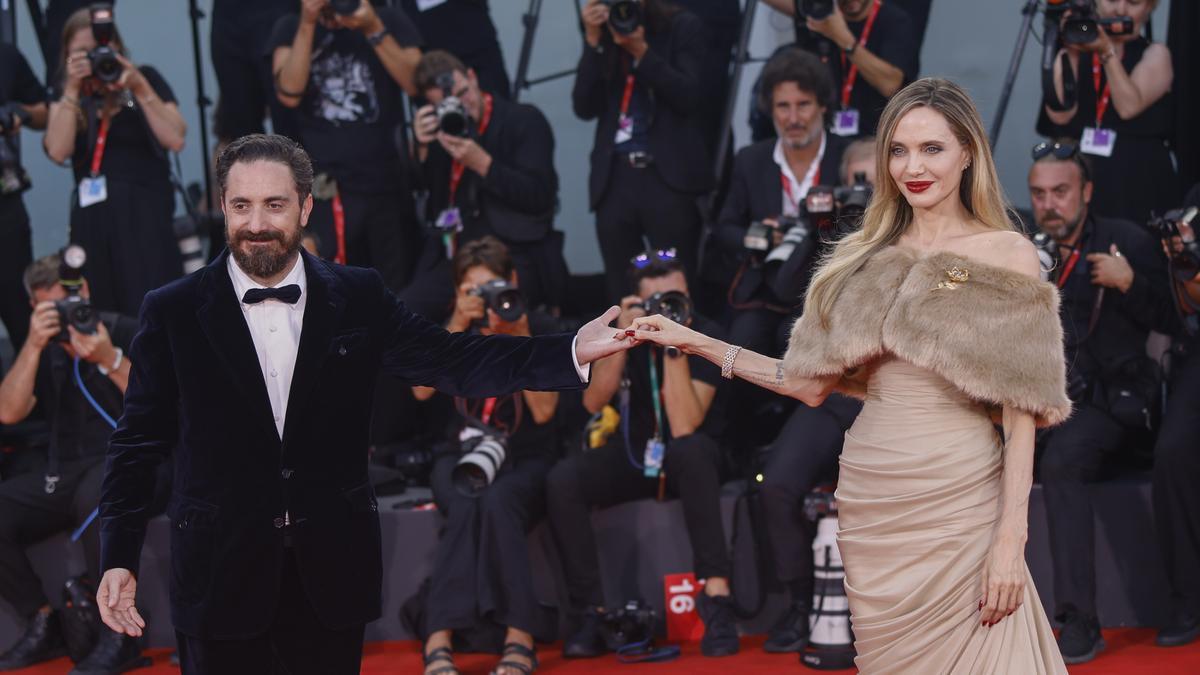
At the prestigious Venice Film Festival last Thursday, the world premiere of Pablo Larraín’s biographical film “Maria,” starring the iconic Angelina Jolie as the legendary opera singer Maria Callas, was met with widespread acclaim and a remarkable 10-minute standing ovation. The film, which is in competition at the festival, delves into the closing days of Callas’ life, focusing on the intense passion that both defined and ultimately consumed her.
The screening took place at the Sala Grande, and it was evident that the film left a profound impact on those in attendance. The audience’s response was overwhelmingly positive, elevating the atmosphere to one of emotional resonance. Many attendees could be heard chanting Angelina Jolie’s name as she became visibly moved. Jolie, who has been nominated for two Oscars in her illustrious career, appeared deeply touched by the reception, shedding tears as she walked down from the gallery to personally acknowledge and greet the audience. The film’s cast, including Pierfrancesco Favino and Alba Rohrwacher, alongside director Pablo Larraín, joined her in a poignant recognition of their efforts and the film’s reception.
During a press conference earlier in the day, Pablo Larraín spoke candidly about the challenges and motivations behind crafting a film about such a monumental figure in the world of opera. Larraín referred to Callas as “the greatest voice in history who had a very beautiful and difficult life,” underscoring that the film’s creation hinged significantly on Angelina Jolie’s involvement. He praised Jolie’s commitment to the role, which included an intensive seven-month period of vocal training. Jolie admitted to feeling “terribly nervous” about singing for the film, a challenge she had never faced in public before. Reflecting on her connection to Callas, Jolie stated, “I share her vulnerability more than anything,” highlighting a personal resonance with the tragic and impassioned life of the opera star.
“Maria” represents yet another ambitious biographical project from Pablo Larraín, marking his third film focusing on prominent female figures. His previous works, “Jackie” (2016) and “Spencer” (2021), both debuted in Venice as well and garnered significant attention.
. The script for “Maria” was penned by Oscar nominee Steven Knight, ensuring a storyline imbued with depth and authenticity. Production was managed by The Apartment, Fabula, Komplizen, and Fremantle, evidencing a robust collaboration aimed at bringing Callas’ story to life with precision and reverence.
Following its debut in Venice, “Maria” is set to be showcased at the New York Film Festival, increasing its visibility and acclaim within international cinema circles. Furthermore, Netflix has acquired U.S. rights to the film, promising a wider release that will allow audiences across the country to experience Jolie’s portrayal of the famed opera singer.
The film’s reception and the audience’s heartfelt response resonate strongly with the industry’s ongoing celebration of biographical dramas that highlight complex and influential women. In “Maria,” audiences are offered a deeply humanistic view of Callas, a woman whose extraordinary talent was paralleled by a life of profound personal challenges and passions.
With the film industry’s increasing shift toward narratives that encapsulate the depth and nuance of real-life figures, “Maria” stands out as a notable entry. Its premiere at Venice not only underscores the festival’s role as a vanguard of global cinema but also reaffirms Angelina Jolie’s stature as one of Hollywood’s most versatile and dedicated actors.
As the Venice Film Festival continues to be a hub for cinematic excellence, “Maria’s” debut encapsulates the spirit of artistic endeavor and the powerful impact of storytelling. Jolie’s embodiment of Callas, supported by Larraín’s directorial vision and Knight’s compelling script, paints a portrait of a formidable woman whose legacy extends beyond the opera stage into the annals of cultural history.
With Oscar buzz already beginning to swirl, “Maria” is poised to carve out its place in the pantheon of beloved biographical dramas, driven by Jolie’s unparalleled dedication and the film’s overarching narrative of passion, art, and the human experience. As “Maria” continues its journey through the film festival circuit and into broader audiences, its initial reception at Venice promises significant critical and popular acclaim in the months to follow.










